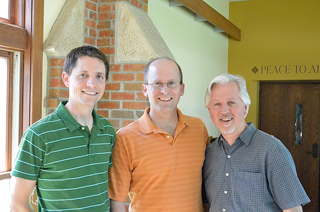
Good News: The Story of Children Changing Worship
by Amanda Weber, M.M. ‘13
Just one year ago, First United Church of Christ in Northfield, MN made a small decision that is having a big impact on the weekly Sunday service: they invited the children to worship. This decision is one that many churches struggle with. It certainly saves time to send the kids to Sunday School during part of worship. It also saves many parents the trouble of dealing with their restless little ones during long sermons and allows annoyed church members sitting near them to worship in peace. Yet the message heard once the children are gone is that Jesus calls us old folk to be like… children. And so, with great faith that allowing the kids to be present for the entire worship service would enrich the faith formation of all present, FUCC made the small, big decision to increase their worship attendance by 40%, adding 50 children to their weekly service.
The older congregation members are not strangers to new, young faces. In the last two years, the pastoral leadership of the church has changed, and as a result, the combined ages of two young pastors is less than the age of one average congregation member. With so much change in who is present on a Sunday morning, FUCC has had to wrestle with what things should change in worship as a result. This dilemma – or, opportunity! – brought three courageous leaders from FUCC to the ISM’s summer Congregations Project. Pastor Todd Smith Lippert and musicians Christopher Brunelle and Bob Gregory came with the proposal for a more “Arts-Infused Worship” that would be an engaging and spiritual experience for all ages.
Throughout the week, Todd, Chris, and Bob joined eight other congregations in conversations around the theme, “Hark the Glad Sound: Inviting New and Returning Christians to Worship.” As the FUCC team attended morning and evening worship services, plenary sessions, and workshops, they were invited into self reflection, asking the questions of why they long for more arts in worship and what this change has to do with the outreach and evangelism evoked in this year’s theme. In my own reflecting, as a quiet observer, I was pulled back to a question I once explored in a college creative writing class.: How does an author build a setting that invites the reader into a sort of dream life? A good story truly captivates a reader, allowing them to respond emotionally and intellectually to the characters’ actions, thoughts, and feelings. But, if ever the author uses a word that just doesn’t fit right, or inserts a fact that doesn’t work with the world they’ve created, or uses wrong or misfit grammar – they break the dream. All of a sudden, the reader remembers that she is simply a reader, and the story is simply ink on a page. The parallel is this: How do you create and lead a worship service that doesn’t “break the dream”?
After observing several short services throughout the week, Todd, Chris, and Bob had many thoughts to offer about this sense of flow in worship. Reflecting, they began to articulate that their current worship form is filled with too many words. “The wordiness of our service speaks to a desire to get a fair bit of expression across. If there were more music, perhaps the sermon wouldn’t feel like more talk, but instead like a unique pause from the music,” Pastor Todd suggested at a group meeting. This team also discussed how replacing some of the spoken words in the liturgy with more sung words and other music might keep things new and fresh, and more important, employ the whole body. The more the team got excited about music, and art, and drama, and movement, the more eager they were to experiment with more fully sensory worship, anticipating its power to engage all members of a congregation, both young and old.
As they plan for change, the team from FUCC has decided to take it one step at a time. They agreed to start with music, inspired to pull together their own songbook of liturgical music that is “simple, yet compelling”: songs grounded in good theology, yet easy to memorize; songs that are easily teachable; songs the help the liturgy flow from one part to the next; songs you would want to hum as you leave church and head out into the world.
The next step may be the crucial one, as it presents a huge challenge for many churches. Todd, Chris, and Bob will encourage the congregation to sing. The congregation’s “simple, yet compelling” songbook will be of no use if the notes on the page are not voiced in living, breathing song! Rita Ferrone, this team’s faculty advisor, reminded seminar participants that “the liturgical musician’s most important instrument is a singing congregation.” Through the fine leadership of Chris and Bob, and with the energy of the children now involved in worship, FUCC will have a 180-voice choir, complete with all members making a joyful (notice, the psalmist never said good) noise!
Just one question remains: what does an Arts-Infused Worship have to do with outreach? Pastor Todd’s response: “We need to be developing more of a culture of invitation in our congregation…and people will be more willing to invite when they’re excited about what’s going on [in worship].” Just as we tell our friends about the good books we’ve read (and the really bad ones), so, too, do we tell of the good worship experiences we’ve had (and the really bad ones). Thus FUCC-Northfield will continue to work towards a worship service that flows and is filled with life and spirit – a worship service that doesn’t “break the dream.” After all, they have a great story to share as they gradually weave together the Gospel and their own community narrative into a Good News Story that will be told over and over again, for years to come.